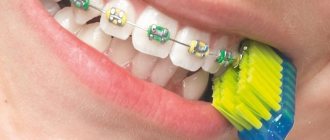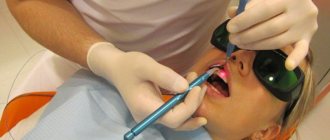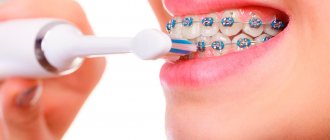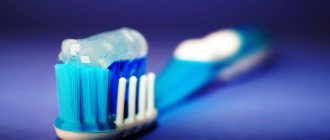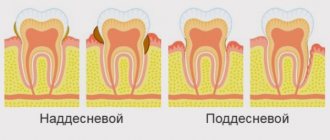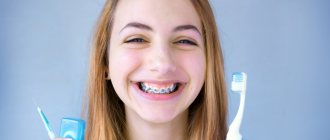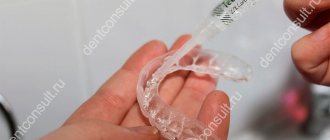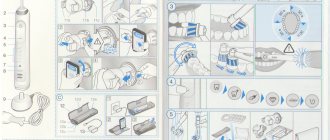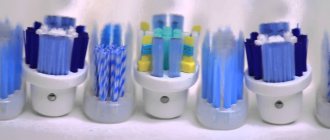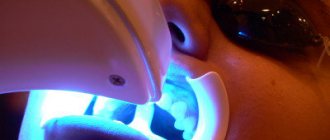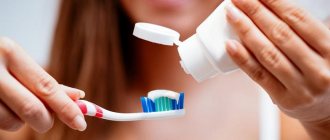Laundry soap, unlike cosmetic soap, contains acids and alkalis. The pH balance level fluctuates at 11-12 units. Made from vegetable and animal fats and acids. Available in bars, liquid and powder. It is considered non-allergenic and has antibacterial properties.
The color of the bar varies from yellowish to dark brown; the numbers on the surface indicate the amount of fatty acids in the composition. Indicators range from 65 to 72%, the latter option is made taking into account GOST. This is the best option to take for the best effect.
Teeth cleaning
Teeth are brushed to maintain healthy gums and oral cavity. Before the invention of toothpaste, powder or soap was used. Not everyone will like the laundry soap solution; there is a risk of swallowing it, which is not recommended. To clean your teeth, choose a high-quality product without any chemical additives.
Dr. Jud, an American professor and scientist, recommended using soap to clean teeth and mouth. He conducted research, the result of which was recommendations to use cosmetic or laundry soap instead of toothpaste. Both options, according to the scientist, are capable of destroying harmful bacteria, as well as glycerin from the surface of the enamel.
The professor recommended moistening the toothbrush with warm water to soften the bristles, then hitting the bar with the bristles several times to gently adhere the particles. Next, you need to carefully move the brush in the direction from the gums to the teeth. Additionally, you can use vitamin C, D, calcium - such supplements will improve the condition of the gums.
For convenience, you can leave a piece of the bar in hot water (100 ml) for 1 hour. Moisten your toothbrush with the resulting solution and brush your teeth 2 times a day. The only thing is that you need a fresh solution every time.
Laundry soap as an alternative to toothpaste
In cases where the paste runs out unexpectedly, and there is no opportunity to purchase a new tube, you can use well-known folk remedies for cleaning your teeth. Due to its positive properties, laundry soap is a good and affordable alternative to industrial toothpastes.
Before brushing your teeth with soap or soapy water, you must purchase a suitable, safe product. To do this, you need to choose soap without chemical additives, which has a neutral smell and light color.
Effect of soap on teeth
The beneficial effect of soap lies in its ability to create gammaglobulin when it comes into contact with mucous membranes. This substance eliminates fungi, bacteria, trichomonas. According to older people who use the method, they rarely go to dentists and do not experience problems. It is important to avoid swallowing the solution and rinse your mouth with warm water after cleaning.
To read: Leukoplakia of the oral cavity: causes, symptoms, forms of pathology
Not every product is suitable - many manufacturers add chemicals, the quality of the detergent is far from what it was in the USSR. But the harm to the body from toothpaste containing fluoride is greater. If you choose between them and soap, you choose the latter; you need to buy the toothpaste that does not contain fluoride.
Traditional medicine recommends preventive teeth cleaning three times a week. The beneficial alkali in it will have a beneficial effect on the balance of microflora in the mouth, and also eliminates plaque, stone, and has an antiseptic effect.
The best product for cleaning dentures
Most patients first of all want to know not how to clean dentures, but what is the best way to do it. Regular hygienic toothpaste is suitable for cleaning. It should not contain abrasive components that can scratch the surface of the structure. After scratches form on it, plaque will accumulate in them.
Tooth powder is not suitable for cleaning dentures. The best choice for this purpose is baby toothpaste. It is not recommended to use soda and dishwashing liquid, as these products can worsen the appearance of the prosthesis.
Other means
Besides soap, there are many other products that you can use instead of toothpaste to clean your teeth:
- table or sea salt. Contains calcium, iodine - substances that support dental health,
- Activated carbon. Grind 2 tablets, pour onto a brush, brush your teeth, then rinse your mouth well. The product removes plaque,
- wheatgrass While relaxing in nature, you can brush your teeth without a toothbrush by chewing young shoots of wheatgrass,
- baking soda. Whitens teeth. You cannot use abrasives often, otherwise the enamel will become thinner,
- currant shoots. Peel off the bark and chew. The substances included in the composition strengthen the gum tissue,
- ash. Acts as an abrasive and disinfectant. Used like activated carbon
- apple. A great way to clean your enamel after eating is to chew on a hard apple. This is a natural massage of the gums, and fruit acids will eliminate germs,
- powdered milk. Reduces the risk of tartar formation, eliminates bleeding and unpleasant odor,
- horsetail Dry grass is crushed using a coffee grinder, applied to a brush, and brushed teeth. The flint contained in the composition stops bleeding and strengthens the gums.
Tooth soap, pros and cons
Pros and cons of using tooth soap instead of toothpaste . Thoughts on the matter.
Tooth soap sounds odd in the 21st century, but it's worth discussing.
Of course, now there is a huge selection of toothpastes, and the use of soap to clean teeth has somehow become forgotten.
I have been making toothpastes and gels for several years. Any toothpaste must contain a component to cleanse tooth enamel - either a surfactant (which is common) or plant saponin (extract of yucca, soap root or soap nuts).
You don’t want to swallow synthetic cheap or even more expensive surfactants. Day after day, microdoses of surfactants enter the stomach along with saliva - this is not physiological. Even harmful.
The use of plant saponins of course increases the price of toothpaste, but God bless him! With price.
But even taking plant saponins, what will you inevitably have to deal with?
That's right, preservative!
We choose the most physiological preservative... There is no other way out. Or rather, it wasn’t until I came across the topic of using tooth soap. I chose tooth soap, and I'll explain why.
1) Natural soap perfectly cleanses teeth and oral cavity from bacteria. (unlike surfactants and plant saponins)
2) It is completely physiological . Even if a drop of the solution is swallowed (although we are adults and would not allow this), it does not cause any harm to the body.
3) Does not require preservatives. Its own antibacterial and antimicrobial properties are so good that they are also in demand among field surgeons.
4) Tooth soap itself strengthens the gums, reduces bleeding, inflammation and tones the tissues. For periodontal disease and stomatitis , it is logical to use it, unless the doctor has prescribed you another means for cleaning your teeth.
5) Soap itself removes plaque well and softens tartar .
6) Using additional additives in soap (sea salt, pine needles, cloves, etc.) we further improve gum care.
7) Coconut oil in soap superfat contributes to the prevention of dental caries .
 Soap has a natural alkaline environment , which is so necessary for dental health.
Soap has a natural alkaline environment , which is so necessary for dental health.
9) And, in the end - efficiency! Yes, simplicity and conciseness. A small block can be used for a very long time.
There are two disadvantages, in my opinion:
1) Unusual . Many people are accustomed to a bright aftertaste after using the paste, myself included.
This can be mitigated by using rinses (tea tree, propolis, mint) with a refreshing taste.
2) It is impossible to introduce such a component as hydroxyapatite .
Hydroxyapatite “cements” microcracks in tooth enamel and is present in some professional toothpastes for sensitive teeth.
That's probably all.
There are no more cons. Some advantages) Yes, it's worth a try!
Possible risks
As mentioned above, not everyone can use laundry soap for oral hygiene. The specific taste in some people causes nausea, even vomiting, therefore, if this method is rejected by the body, there is no need to force it, choose another remedy from the above.
Natural laundry soap is active against germs. On the one hand, this is good, but on the other hand, with regular use, the body stops fighting pathogenic microorganisms on its own. In order not to reduce the capabilities of the immune system, provoking the risk of serious viral and infectious diseases, you need to use this remedy carefully.
To read: Remedies for bleeding gums accompanied by an unpleasant odor
When brushing your teeth with a foam solution, you should refrain from swallowing saliva and foam, as this can cause indigestion and diarrhea.
Do you feel nervous before visiting the dentist?YesNo
Another unpleasant consequence of brushing your teeth with laundry soap is a change in the color of your teeth. This side effect occurs over time and not in every case. But after about a year of regular use, the enamel may turn slightly yellow.
This is not noticeable because people’s teeth are not naturally white. However, if you want to shine with a Hollywood smile, you need to use the product rarely (once a week), or abandon the method in favor of other folk remedies listed above.
Reviews
Most reviews are left by people of the older generation, who have long known the healing properties of laundry soap. It is used for cosmetic purposes, to get rid of dandruff and split ends, to treat dermatitis, pimples and acne. When it comes to brushing your teeth, some people prefer to use a good toothpaste followed by a foamy mouth rinse. It turns out that fungi, bacteria and microbes on the teeth and gums are completely eliminated. Gums and teeth, judging by reviews, become healthy, caries ceases to bother you.
Brushing your teeth with a foam solution is recommended not only by grandmothers, but also by experienced doctors. Sometimes this method becomes the only way to get rid of inflammation and bleeding gums when other means do not work.
People talk about their experiences using laundry soap. Some people, from childhood, were taught by the older generation to brush their teeth with soap, so they have no unpleasant associations with its taste or smell. For others, it is more difficult to get used to a specific taste, but if you evaluate its effectiveness, you can be patient. Yes, the taste of modern toothpastes is much more pleasant, but not all of them are truly healthy and harmless.
The most common use is to lubricate your toothbrush or soak it in a foam solution overnight. Overnight, all germs are completely eliminated, there is no risk of oral infection. This does not eliminate the rule of changing your brush every three months, but it will make your hygiene safer during this time.
To summarize, it can be noted that laundry soap really helps with many cosmetic problems, inflammatory processes on the skin and oral mucosa. Proper use after consultation with a doctor will be beneficial, but if you neglect sound recommendations, you can only worsen your health.
Benefits of soap for the mouth
Regular laundry soap has numerous beneficial properties:
- is a bactericidal agent;
- has a disinfecting effect, destroys bacteria, fungi and microbes in the oral cavity;
- strengthens the chewing organs;
- prevents the appearance of caries, irritation and bleeding of the gums;
- removes food debris and plaque, thoroughly cleans and whitens enamel without damaging it;
- helps get rid of bad breath;
- stops the deposition of tartar;
- is a harmless natural remedy.
Cleaning your teeth with laundry soap helps treat periodontal disease, stomatitis and other unpleasant diseases.
In addition, you can treat your toothbrush with an aqueous solution of this natural remedy. This will help remove dirt from the bristles and disinfect the surface.
Despite many positive qualities, laundry soap has an unpleasant specific taste and can cause a gag reflex.
